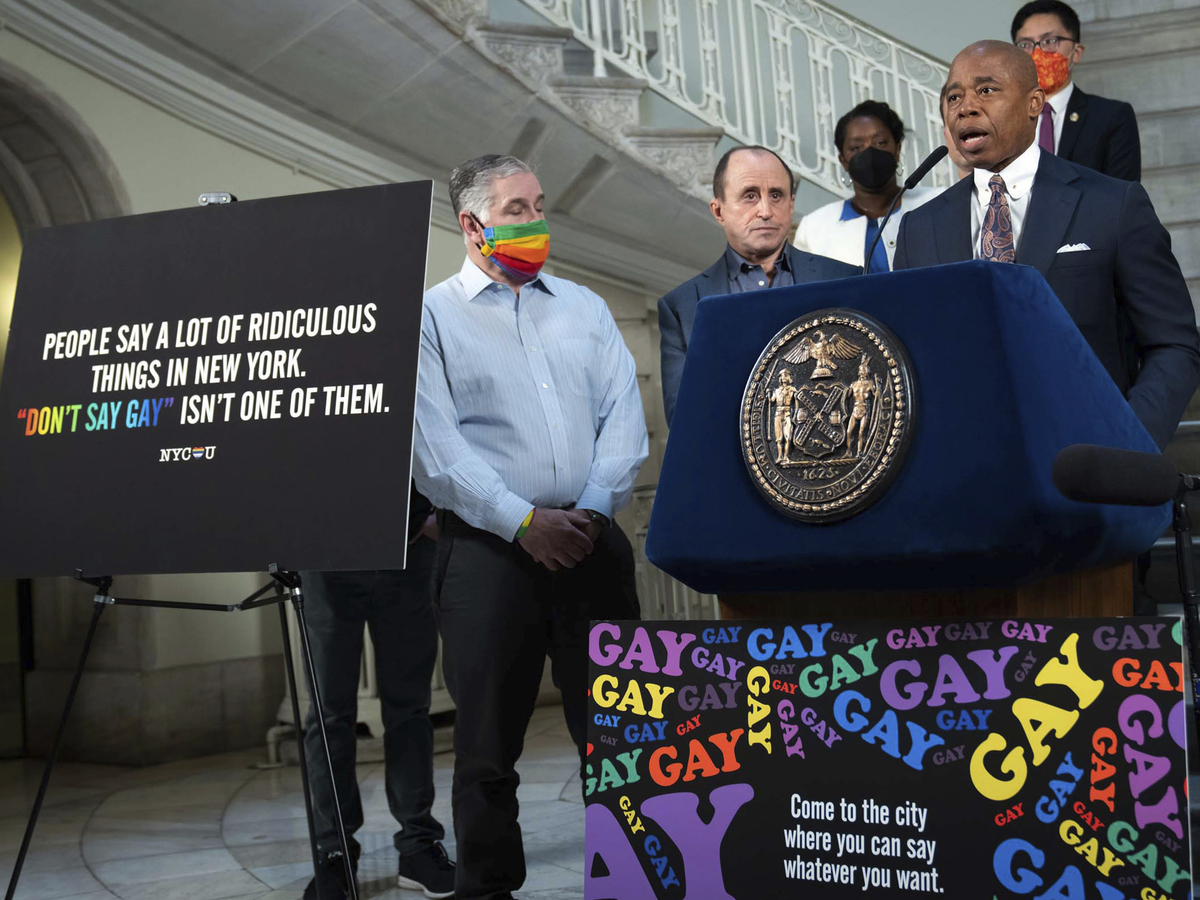Table of Contents

Demonstrators gather on the steps of the Florida Historic Capitol Museum in front of the Florida State Capitol, March 7, 2022, in Tallahassee, Florida
Wilfredo Lee/AP
hide caption
toggle caption
Wilfredo Lee/AP

Demonstrators gather on the steps of the Florida Historic Capitol Museum in front of the Florida State Capitol, March 7, 2022, in Tallahassee, Florida
Wilfredo Lee/AP
First Florida. Then Alabama. Now, lawmakers in Ohio and Louisiana are considering legislation that mimics the Florida law. And Texas Gov. Greg Abbott says he’ll make a similar bill a top priority at the next session.
Across the United States, at least a dozen states are considering new legislation that in several ways will mirror Florida’s new controversial law, referred to by some opponents as “Don’t Say Gay.”
The specific details regarding the bills vary between states. But overall, they seek to prohibit schools from using a curriculum or discussing topics of gender identity or sexual orientation.

“The institutionalization of these bills is an overt form of structural transphobia and homophobia, and it goes against all public health evidence in creating a safe and supportive environment for transgender, nonbinary, queer, gay and lesbian youths and teachers to thrive,” Arjee Restar, assistant professor of epidemiology at the University of Washington, told NPR.
Restar, a social epidemiologist and health equity advocate, said the controversial bills will limit all youths to live to their fullest potential, adding “there should be no room for transphobia and homophobia — especially in the classroom.”
The Florida law drew controversy — and copycats
Last month, Florida Gov. Ron DeSantis signed the state’s “Parental Rights in Education” bill, barring public school teachers from holding classroom instruction about sexual orientation or gender identity for students in kindergarten through third grades “or in a manner that is not age-appropriate or developmentally appropriate for students in accordance with state standards.”
“We will make sure that parents can send their kids to school to get an education, not an indoctrination,” DeSantis said at the bill signing.

Paula Stephens teaches first grade.
Paula Stephens
hide caption
toggle caption
Paula Stephens

Paula Stephens teaches first grade.
Paula Stephens
It drew immediate nationwide controversy — and had teachers like Paula Stephens worried.
Teaching about sexual orientation and gender identity isn’t part of the first–grade curriculum, Stephens told NPR. But talking about families is part of her curriculum, and some of her students may have two moms or two dads.
“It makes me wonder,” she said. “When I talk about families in my classroom, am I going to be violating this law because the children were having discussions about what their family looks like?”
A cascade of bills have followed
Taking Florida’s lead, states began proposing their own bills. Among them:
- Alabama advanced a measure prohibiting early classroom instruction on sexual and gender identity.
- An Arizona bill aims to change the state’s sex-ed curriculum to focus on biological sex and “not gender identities.”
- In neighboring Georgia, lawmakers targeted private schools — which the state can regulate. But it failed to get any traction this year.
- In Iowa, a Senate proposal would require that parents opt in — in writing — to any instruction “relating to gender identity.”
- In Louisiana, lawmakers introduced HB 837. It would limit discussion of sexual orientation or gender identity in some grades and prohibit it all together in others. A South Carolina bill is similar.
- A Missouri bill would ban “gender or sexual diversity training” in public schools. An Indiana bill does the same. As would a Kentucky bill.
- In Oklahoma, a senate bill would ban books from school libraries that focus on “the study of sex, sexual lifestyles, or sexual activity.”
- Tennessee‘s HB 800 bans books and instructional materials “that promote, normalize, support, or address lesbian, gay, bi-sexual, or transgender issues or lifestyle.”
- Ohio‘s HB616 has similar language used in the Florida bill.

In this Feb. 18, 2021 file photo, State representatives gather at the Capitol in Phoenix. Two years after Arizona lawmakers repealed a law barring any instruction on HIV or AIDS that that “promotes a homosexual lifestyle,” they are close to enacting a broad remake of the state’s sex education laws with a particular focus on LGBTQ issues.
Matt York/AP
hide caption
toggle caption
Matt York/AP

In this Feb. 18, 2021 file photo, State representatives gather at the Capitol in Phoenix. Two years after Arizona lawmakers repealed a law barring any instruction on HIV or AIDS that that “promotes a homosexual lifestyle,” they are close to enacting a broad remake of the state’s sex education laws with a particular focus on LGBTQ issues.
Matt York/AP
“When we segment children off and tell them that they don’t exist and that they don’t matter and effectively erase them from the classroom … we effectively erase them,” Kathryn Poe of Equality Ohio told NPR member station WKSU when the Ohio bill was proposed. “We alienate an entire group of young people who need our affirmation and support.”

There’s historical precedent
Florida’s law is only the most recent expression of attempts to curb classroom discussion on sexual orientation or gender identity across the country, said Ames Simmons, a Duke law senior lecturing fellow.
“Florida may be the first in this wave, but there have been other laws in the past that were called ‘no promo homo’ laws, which forbid saying positive things about lesbian, gay, bisexual, and queer people in classrooms,” Simmons told NPR. “With the increased visibility of transgender and non-binary people, we have seen these bills expand to also prohibit educating students about gender diversity and gender identity.”

New York Mayor Eric Adams, at podium, addresses a news conference in the rotunda of City Hall, in New York, on April 4. New York City is launching a digital billboard campaign, supporting LGBTQ visibility that will be displayed in five major markets in Florida for eight weeks, to lure Floridians unhappy with their state’s “Don’t Say Gay” law to the Big Apple, Adams announced.
Ed Reed/AP
hide caption
toggle caption
Ed Reed/AP

New York Mayor Eric Adams, at podium, addresses a news conference in the rotunda of City Hall, in New York, on April 4. New York City is launching a digital billboard campaign, supporting LGBTQ visibility that will be displayed in five major markets in Florida for eight weeks, to lure Floridians unhappy with their state’s “Don’t Say Gay” law to the Big Apple, Adams announced.
Ed Reed/AP
Both Simmons and David Brown, legal director for the Transgender Legal Defense & Education Fund, say the legislative activities taking place across the country are targeting other groups.
“This trend is the continuation of a playbook that has been brought out again and again, repeatedly targeting the most marginalized groups in our society for political gain,” Brown told NPR.
Simmons added, “What is truly concerning is that these anti-LGBTQ bills have been coupled with legislative proposals that forbid teaching about structural racism and slavery, and patriarchy and sexism, on the grounds that these concepts make others uncomfortable.”
You may also like
-
Criminal Defence Lawyers Australia: Protecting Your Rights and Freedom
-
B.C. law firm reprimanded for citing pretend scenarios invented by ChatGPT
-
DNC files motion to dismiss case challenging Nevada’s mail ballot law | Politics and Government
-
Elon Regulation administrator receives GBA’s best award | These days at Elon
-
Judge orders shared custody of pet puppy below new B.C. law

